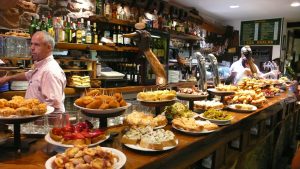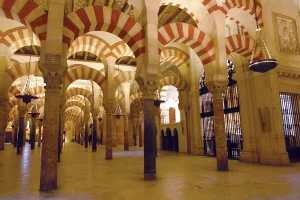
Cordoba, Baghdad, Alexandria, the homes to Andalusí Renaissance
The language of the first Renaissance in Europe, wasn’t Italian, but Arabic. Italian Renaissance came four centuries later, and its ways were in part paved by the Middle East and Andalusian early movement.
Caliphs, rulers from Cordoba, Damascus, Baghdad, Alexandria, injected huge funds into the enterprise of boosting scientific knowledge and this, in turn, had profund consecuences in science, poetry, and the fundation of huge bibliotheques.
Greek, Syrian, Persian, Sanskrit, Latin books and codes, all was translated into Arabic: the translation movement begun. Search for and find the knowledge, everywhere, wherever you could find it, and bring it here: this was the mission that rulers gave to all scholars at that time. They understood that scientific knowledge and political power go hand in hand. The ideology accompanied : the Prophet himself recommended that the tough study for better comprehension of the creation of Allah, is a religious duty.
Thus, during two centuries, from 750 to 950 aC caliphs went on sending their people to the fur corners of the known world, in search for books and wisdom. The culture explorers (scholars) were paid extremely well for their trips and findings. Leaders were motivated by a pressing concern: keep and extend their cultural influence and political power.
They especially appreciated medicine books: you know that wealthy people want to live forever! Everybody wanted to learn and preserve medicine, especially herbal medicine from China and India: this continuous work lead to the birth of western pharmacy and surgery (see Al Zarawi Albucassis, Al Gafequi both from Cordoba). Scholars like Avicenna (Ibs Sina) from today’s Uzbekistan and Iran, were able to concentrate in a single work all the available medical knowledge from the East.
Napoleon wasn’t the one that started Egyptology, nor it started in the XIX cent. Egyptology was born 1000 years before when Islamic scholars cracked part of hieroglyphics to help Caliph Mahmon to discover the secrets of the Alchemy behind the hieroglyphics, but could not succeed.
The huge translation movement generated into the Middle East and Al Andalus (Spain and Portugal), finally caused merchants and scholars acting like thousands of cultural links between Europe and Asia through North Africa. Capital cities like Baghdad, Cordoba, Alexandria, experienced a fierce competition for patronage. Seminars were constantly held, where aristocrats, scientists, philosophers, physicians, astronomers, geometers, surgeons, the best brains and the biggest powers met and discussed all kind of subjects.
Now, we can you explain how Indian decimal system got to the Mediterranean basin, and made computation much easier. Whitout the zero, could you imagine algebra, algorhithm and the bases of modern tools of calculation?
Not even computers could exist without long series and combinations of zeros and ones.
If you want to watch a beautiful set of documentaries on this subject, check this link and search for those from Dr Jim Al-Khalili.

Cordoba, Baghdad, Alexandria, the homes to Andalusí Renaissance
The language of the first Renaissance in Europe, wasn’t Italian, but Arabic. Italian Renaissance came four centuries later, and its ways were in part paved by the Middle East and Andalusian early movement.
Caliphs, rulers from Cordoba, Damascus, Baghdad, Alexandria, injected huge funds into the enterprise of boosting scientific knowledge and this, in turn, had profund consecuences in science, poetry, and the fundation of huge bibliotheques.
Greek, Syrian, Persian, Sanskrit, Latin books and codes, all was translated into Arabic: the translation movement begun. Search for and find the knowledge, everywhere, wherever you could find it, and bring it here: this was the mission that rulers gave to all scholars at that time. They understood that scientific knowledge and political power go hand in hand. The ideology accompanied : the Prophet himself recommended that the tough study for better comprehension of the creation of Allah, is a religious duty.
Thus, during two centuries, from 750 to 950 aC caliphs went on sending their people to the fur corners of the known world, in search for books and wisdom. The culture explorers (scholars) were paid extremely well for their trips and findings. Leaders were motivated by a pressing concern: keep and extend their cultural influence and political power.
They especially appreciated medicine books: you know that wealthy people want to live forever! Everybody wanted to learn and preserve medicine, especially herbal medicine from China and India: this continuous work lead to the birth of western pharmacy and surgery (see Al Zarawi Albucassis, Al Gafequi both from Cordoba). Scholars like Avicenna (Ibs Sina) from today’s Uzbekistan and Iran, were able to concentrate in a single work all the available medical knowledge from the East.
Napoleon wasn’t the one that started Egyptology, nor it started in the XIX cent. Egyptology was born 1000 years before when Islamic scholars cracked part of hieroglyphics to help Caliph Mahmon to discover the secrets of the Alchemy behind the hieroglyphics, but could not succeed.
The huge translation movement generated into the Middle East and Al Andalus (Spain and Portugal), finally caused merchants and scholars acting like thousands of cultural links between Europe and Asia through North Africa. Capital cities like Baghdad, Cordoba, Alexandria, experienced a fierce competition for patronage. Seminars were constantly held, where aristocrats, scientists, philosophers, physicians, astronomers, geometers, surgeons, the best brains and the biggest powers met and discussed all kind of subjects.
Now, we can you explain how Indian decimal system got to the Mediterranean basin, and made computation much easier. Whitout the zero, could you imagine algebra, algorhithm and the bases of modern tools of calculation?
Not even computers could exist without long series and combinations of zeros and ones.
If you want to watch a beautiful set of documentaries on this subject, check this link and search for those from Dr Jim Al-Khalili.



